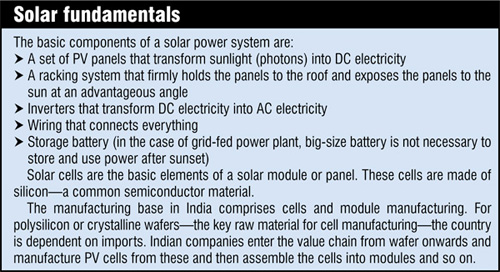The solar photovoltaic (PV) industry is off to a promising start in India. From less than 5 MW at the end of 2009, the total installed capacity in India is expected to cross 500 MW by March this year.
For graduate engineers eyeing the energy sector for jobs, solar companies could just be their next big destination. For every ten jobs created in solar factories, there will be 15 jobs created downstream, in installation, financing, project development and distribution. So to fulfil the target of 20,000 MW of installed solar power capacity under the National Solar Mission (NSM), the Indian solar sector would need over 100,000 skilled solar professionals by 2022. If we consider the potential employment generation by state solar policies, the cumulative figure would be much higher.
The solar industry will require 60-65 per cent electrical engineers, 20-25 per cent mechanical engineers, 10 per cent electronics engineers and remaining civil engineers in areas where technical expertise is required. Even now, there is tremendous dearth of experienced hands as well as entry-level resources in the solar sector. Solar companies are poaching talent from top conventional power companies in the public and private sectors. Experienced professionals are hopping from one company to another every six months for better compensation packages.
Given that the industry is expanding fast, career opportunities are only going to grow.
Where all can you get into
 Both sides of the solar business—equipment manufacturing and power generation—need people to cash in on the growth in the solar industry. Solar PV systems involve use of semiconductor technology. Hence electronics engineers, along with mechanical and electrical engineers, have a role to play in the solar industry.
Both sides of the solar business—equipment manufacturing and power generation—need people to cash in on the growth in the solar industry. Solar PV systems involve use of semiconductor technology. Hence electronics engineers, along with mechanical and electrical engineers, have a role to play in the solar industry.
The most common jobs for electronics engineers are in fabrication, testing and wiring of solar cells and modules. In India, most of the solar industry is based on crystalline or polycrystalline silicon solar cells and amorphous silicon solar cells.
Though R&D and production are the most suitable for electronics engineers in this industry, they would find a suitable position in instrumentation, installation, operation and monitoring, financing and project development related works as well. Installation and operation of large-scale PV systems is slowly and steadily gaining momentum, creating many opportunities.
In the instrumentation sector, there are various positions available with the inverter, charge controller and power conditioner manufacturers like Siemens, ABB, Schneider, Focus, Optimal Power Solutions and Bonfiglioli.
 Skill sets required
Skill sets required
You can work in the solar industry as a solar PV design engineer, process engineer, R&D professional, sales and marketing engineer, production manager, project manager, PV fabrication and testing technician, and so on.
Solar system engineers and managers create system solutions around charge controllers and inverters for grid-tied and off-grid solar applications. They work with customers for technical presentations, perform testing and qualification for internal R&D, and are a systems expert to work with marketing. For this position, you should be a B.Tech or M.Tech, and have the basic knowledge of solar systems, PV panels, inverter systems, DC cabling and SCADA systems. You should be highly analytic and capable of handling all the test equipment including logic analysers and remote monitoring. Knowledge of financial aspects of project report preparation, cost estimation and proposal preparation is required. Also, you must possess excellent communication skills, negotiation skills and analytical skills. You must be able to foresee the things and take actions proactively.
Process engineers are required to have experience in solar photovoltaic cell/module or semiconductor device manufacturing.
If you are interested in R&D, you should either have a Ph.D in solidstate physics, BE/B.Tech in electronics & communication engineering, or M.Sc. in electronics or solidstate physics. For a senior position, some experience in electronics R&D, and technology management and product development processes is required.
To get into quality assurance, you should be a BE or B.Tech in electronics and communication engineering or in electronics and electrical engineering with experience in the field of quality management in either a manufacturing, electronics, light engineering or semiconductor industry. You should be well versed with advanced practices and concepts in quality management and have the capacity to drive quality culture across all functional areas.
BE in electronics with MBA and two-three years of experience in industrial marketing in the solar/renewable energy field will qualify you for the position of sales and marketing engineer. You should be willing to travel to different places. As you gain experience, you can grow to the position of manager for sales and marketing.
For equipment maintenance, you should be a BE or B.Tech in electronics and electrical engineering with experience in equipment maintenance in a manufacturing industry. You should have worked with programmable logic control based equipment. Also, you should be good at troubleshooting and runing machines with minimal down time.




